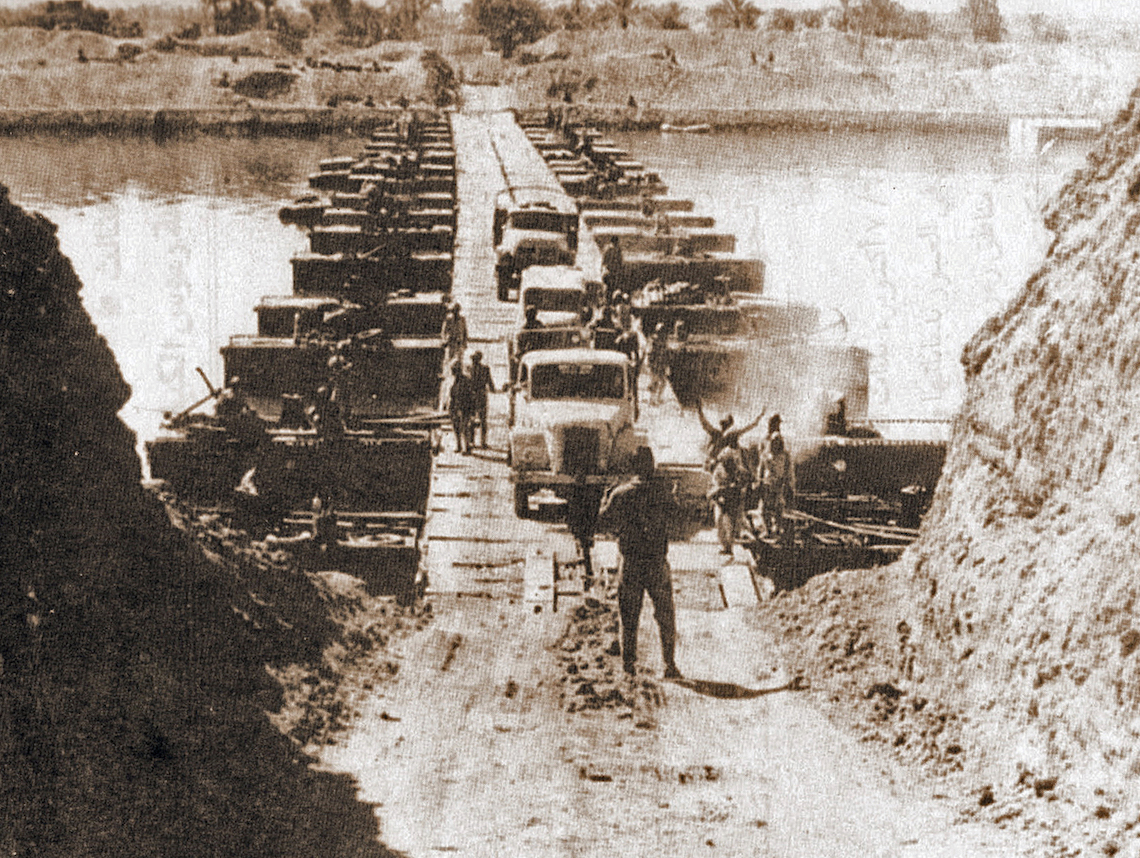 Egyptian military trucks cross a bridge laid over the Suez Canal on October 7, 1973, during the Yom Kippur War/October War. Photo from Wikipedia.
Egyptian military trucks cross a bridge laid over the Suez Canal on October 7, 1973, during the Yom Kippur War/October War. Photo from Wikipedia. The tank company had pulled back beyond Egyptian artillery range to refuel. Platoon commanders, determined-looking young men with stubbly, 2-week-old beards, gathered around a map of the Golan Heights that a visiting information officer had laid on the ground. They listened intently as he explained how the Syrians had been driven back after almost capturing the Heights, 300 miles to the northeast. It was the first clear indication the officers had of how the war was going on the northern front.
It was the waning days of the 1973 Yom Kippur War. The Golan front had stabilized and I had come down to Sinai as a Jerusalem Post reporter for a glimpse of the endgame beginning to play out on the Egyptian front.
The company commander said his unit had been in combat every day since the war started two weeks before on Yom Kippur afternoon. He was highly complimentary of the Egyptian infantry, which had wielded antitank weapons with devastating effect — “They fought like men” — but he said the Egyptian tank corps had not improved since the Six-Day War. His men were supposed to have been pulled back for a brief rest but they refused to be rotated off the line. “As long as they want to stay, we’ll let them,” he said.
An officer, hearing my American accent, summoned a tall lieutenant whose left arm was covered from wrist to elbow with a fresh bandage, incongruously white in contrast to the brown dust that covered tanks and uniforms. The military censor did not permit publication of family names of officers but the lieutenant could give his first name: Alan.
Alan hailed from Beverly Hills, of all places, and was the son of a doctor. On his own, he had immigrated to Israel four years before, straight out of high school at age 18, and settled in a kibbutz. He was serving as a forward artillery observer, which meant he was almost constantly exposed to enemy fire. In an article the next day, I mentioned my encounter with a soldier from Beverly Hills.
About 10 days later, I received a call from Alan’s kibbutz. The war had ended but he had not been heard from and the army could not account for his whereabouts. His sister, who was in the country, had seen my article and informed the kibbutz. Did I know what might have happened to Alan, the caller asked? I could only note that some of the tank officers in the unit to which he was attached were from Kibbutz Bait Hasheeta. Perhaps they knew something. Not long afterward, the kibbutznik called to inform me that Alan had been killed while crossing the Suez Canal in Israel’s final push. According to an obituary subsequently issued by the army, his halftrack had been hit and he had mounted another in order to wield its machine gun. But that vehicle was also hit and he was killed.
Years later, after publication of my book, “The Yom Kippur War,” I received a letter from a friend of Alan’s who informed me of his family name, Chersky. I wrote his parents to describe my brief wartime meeting with their son. The father, Dr. Joseph Chersky, who had participated in the Battle of the Bulge in Belgium as a U.S. Army private in World War II, wrote back that Alan, in moving to Israel, had been motivated by concern “about the preservation of the Jewish people.” I was able to tell him Alan’s final words to me as we shook hands in parting — just a few hours, apparently, before he was killed:
“I feel fulfilled.”
ABRAHAM RABINOVICH is a journalist born and raised in New York City, who lives in Jerusalem. He is the author of six books, including “The Yom Kippur War,” “The Boats of Cherbourg” and “Jerusalem on Earth.” A revised and updated edition of “The Yom Kippur War” was published this month by Schocken (New York).





















 More news and opinions than at a Shabbat dinner, right in your inbox.
More news and opinions than at a Shabbat dinner, right in your inbox.